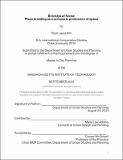Brooklyn of Korea: Place branding as a process in production of space
Author(s)
Kim, Poun Laura
DownloadThesis PDF (23.27Mb)
Advisor
Adams, Marie Law
Terms of use
Metadata
Show full item recordAbstract
In planning and development practices, branding is often used as a promotional tool to attract investments and tourists, and thought of as a mechanism to portray a selected image of a place. In this thesis, I argue that the branding process can be one of the driving forces of neighborhood change and that place brands play an active role in producing sense of place along with physical and social changes. As cities increasingly choose images to communicate outwards and reposition themselves after the decline of industry, it is important to understand the role place brands play in the production and transformation of space.
This thesis examines a neighborhood in transition, Seongsu-dong, Seoul, South Korea. From being one of Seoul’s few semi-industrial zones to a “hot place” for cultural and commercial activities, Seongsu has seen large shifts in the past decade, widely branded with the label “Brooklyn of Korea.” With diverse parties using the Brooklyn brand in different ways while leveraging similar qualities, Seongsu provides a rich case study on how branding as a process not only shapes images of a place, but can also impact the built environment. Through qualitative and quantitative analysis, this thesis tries to bridge the gap between portrayal of neighborhood change and tangible changes and answers: How are place brands created? What are the brands and how do they relate to neighborhood change? And what can place brands tell urban planners about neighborhood change?
Date issued
2021-09Department
Massachusetts Institute of Technology. Department of Urban Studies and PlanningPublisher
Massachusetts Institute of Technology